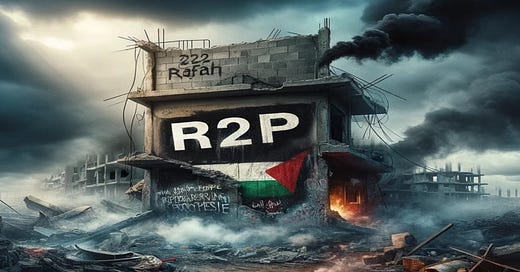Abandoned by Humanity: When the World Watches Genocide!
An Examination of Israel's Actions in Gaza Reveals a Stark Failure of the Global Promise to Protect.
The following OP-ED by our Editor, Nawaf M. Al-Thani, is being jointly published on Polistratics.com and Qatar’s Al-Raya (in both English and Arabic, respectively).
The international norm of the Responsibility to Protect (R2P) is founded on the premise that sovereignty is not a privilege but a responsibility. R2P posits that states must protect their populations from genocide, war crimes, ethnic cleansing, and crimes against humanity. When a state fails to do so, the international community, under the auspices of the United Nations, must step in to protect the afflicted populace. The ongoing crisis in Gaza, particularly in Rafah, provides a stark context in which the failure of R2P not just as a doctrine but as a practical mechanism of international intervention comes into full view.
The Current Crisis in Gaza
Recent reports from international news agencies have highlighted escalating violence in Gaza. A spokesperson for the Israel Defense Force (IDF) commented on the airstrike in Rafah that killed 45 civilians, describing the incident as a “tragic mistake” by the Israeli military targeting a supposed “Hamas compound.” This event is part of a series of actions that have been described by Oxfam and other Humanitarian organizations as “beyond catastrophic,” indicating a severe humanitarian crisis.
More news reports detailed further atrocities, noting continuous bombardment in Rafah that has led to substantial casualties. The attacks have included strikes on tent camps housing displaced Palestinians, leading to scores of deaths, predominantly among women and children—a direct violation of the principles outlined in R2P.
Global Outrage and the Response of the International Community
The international reaction to these events has been one of widespread condemnation. The African Union criticized Israel for violating international law “with impunity,” directly referencing a recent International Court of Justice ruling demanding a cessation of military activities in Rafah. Leaders from countries like Chile and Colombia have openly condemned the attacks, with Colombian President Gustavo Petro labeling the situation as a “massacre.”
European nations have echoed this sentiment, with France’s President Emmanuel Macron explicitly stating that “these operations must stop.” Such international responses underscore the global consensus on the severity of the situation and the need for immediate action under the R2P framework.
R2P: A Framework Underutilized
The doctrine of R2P is explicitly clear in situations like Gaza. When a state commits actions that harm its own people or others under its control, as Israel is - and has been - doing the international community is obliged to intervene. This intervention should be multilayered, beginning with diplomatic efforts to prevent further atrocities and escalating, if necessary, to military intervention to protect civilians. The ongoing situation in Rafah, where the Israeli military operations have been reported to cause extensive civilian casualties, presents a textbook case for R2P intervention.
However, the application of R2P has been inconsistent and fraught with geopolitical complications. The major powers on the United Nations Security Council (UNSC), whose approval is necessary for military intervention under R2P, remain divided on issues pertaining to Israel and Palestine. The United States, a key player in the region, has often vetoed or opposed resolutions perceived as anti-Israel, which complicates the potential for a unified international response under the R2P doctrine.
The Path Forward
Given the deteriorating situation in Gaza, the international community must reconsider its approach to R2P. This involves not only recognizing the doctrine’s potential but also addressing the political obstacles that hinder its application. The UNSC must take a principled stand in line with international law and the R2P framework, prioritizing the protection of civilian lives over geopolitical alliances.
Moreover, individual states and regional organizations should enhance their diplomatic efforts to broker peace and ensure the safe delivery of humanitarian aid. The international legal institutions, such as the International Criminal Court, must be supported in their efforts to hold perpetrators accountable, reinforcing the message that international norms and laws cannot be flouted without consequences.
In Conclusion …
The crisis in Gaza, with Rafah as a focal point of recent atrocities, presents a critical test for the international community’s commitment to the R2P doctrine. The stark images of destruction and the harrowing reports of civilian casualties call for more than condemnation—they demand action. If the international community continues to fail in its duty to protect the most vulnerable, the very credibility of the R2P framework, and indeed of the international system at large, is at stake. It is time for decisive, unified, and effective action that aligns with the moral and legal obligations that underpin the Responsibility to Protect.









